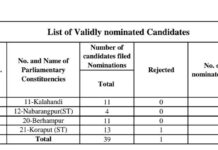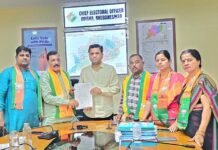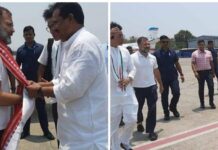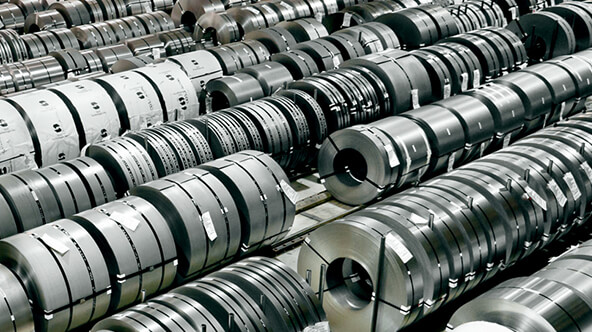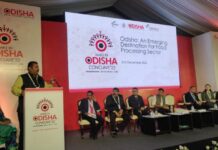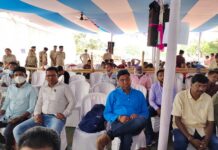By Our Correspondent
NEW DELHI/BHUBANESWAR: Union Minister for Steel-PNG Dharmendra Pradhan in a written reply in the Rajya Sabha on Wednesday said that Steel is a deregulated sector and the decisions regarding setting up production capacity of any steel grades are taken by an individual company, based on techno-economic considerations.
The per capita consumption of finished steel for the year 2019-20 was 74.7 kg. against the world average of 229 kg. during the same period, as per the data released by the World Steel Association. The steps taken by the Government to encourage the domestic steel makers and to enhance the per capita consumption are as following:-
National Steel Policy, 2017 notified on 08th May, 2017 envisages domestically meeting the entire demand of steel and high-grade automotive steel, electrical steel, special steel and alloys for strategic applications. It also aims at increasing the per capita consumption of steel to 160 kg. by 2030-31.
Domestically Manufactured Iron & Steel Products (DMI&SP) Policy encourages production and consumption of domestically produced steel.Issuance of Steel and Steel Products Quality Control Order for compulsory BIS certification for 145 Iron and Steel Products in order to ensure that the quality of steel being manufactured by domestic producers or imported in the country is as per the Indian Standards.
Inclusion of ‘specialty steel’ under the Production Linked Incentive (PLI) Scheme recently announced by the Government to help attract capital investments and production of specialty steel in the country.
The Steel Scrap Recycling Policy, 2019 envisages to set up environmentally sound management system to encourage processing and recycling of ferrous scraps through organized and scientific metal scrapping centers across India to minimize dependency on import of scrap and make India self-sufficient in scrap availability with an aim to promote 6Rs principles of Reduce, Reuse, Recycle, Recover, Redesign and Re-manufacture. Steel Import Monitoring System (SIMS), an online platform for advance registration of intended imports of steel, notified on 05.09.2019, requiring the intended steel importers to submit advance information for intended imports and help the industry to plan domestic manufacturing.
Ministry of Steel has held the following Webinars to enhance the consumption and overall demand for steel in the country:-Oil and Gas Sector, 16th June, 2020. Ispati Irada, Enhancing Steel Usage, 30th June, 2020. Housing and Civil Aviation Sector, 18th August, 2020.Agriculture, Rural Development, Dairying and Food Processing Sectors, October 20, 2020.The Government, vide Notification dated 01.10.2020, has allowed domestic steel producers to provide limited quantum of four product categories of steel (Hot Rolled Coil, Cold Rolled Coil, Wire Rods and Alloy Steel Bars) to MSME members of EEPC at an export parity price, Pradhan said.
On utilisation of CSR Funds of Steel PSUs, Pradhan said the amount under Corporate Social Responsibility (CSR) is allocated and utilised by various Companies in accordance with the broad framework provided by the Government under section 135 of the Companies Act, 2013 (‘Act’) and Companies (CSR Policy) Rules, 2014, as amended from time to time. The Act, inter-alia, stipulates that companies exceeding the threshold limits, as specified in the Companies Act, 2013, have to allocate at least 2% of their average net profits of the company made during the three immediately preceding financial years for CSR activities.
The Board of a company is empowered to plan, decide, execute and monitor CSR activities of the company. Schedule VII of the Companies Act indicates the activities that can be undertaken by the companies, which, inter-alia, include Health care, Education and Rural Development Projects, etc. Further, the first proviso to section 135 (5) of the Act provides that the company shall give preference to local areas and the areas around it where it operates.
SAIL has carried out CSR activities in areas such as Education, Providing Health-care facilities, Women Empowerment, Sustainable Income Generation through Self-Help Groups, Assistance to Divyangs, Promotion of Sports coaching, Traditional Art and Culture, Access to Water facilities and Sanitation, Environment Sustainability, etc.
CSR activities have been carried out mainly in the States/UTs of Chhattisgarh, Jharkhand, Odisha, West Bengal, Madhya Pradesh, Tamil Nadu, Maharashtra, Karnataka, Kerala, Delhi, Uttar Pradesh and Haryana.RINL has carried out CSR activities in areas such as Health, Drinking water, Swachh Bharat and Help during natural calamities, Education and Skill Development, Women Empowerment and Senior Citizen Care, Environment and Clean Ganga, Sports, Rural Development, Slum Area Development, Survey/ Assessments etc.
CSR activities have been carried out mainly in the States/UTs of Andhra Pradesh, Telangana, Uttar Pradesh, Delhi, Madhya Pradesh, Haryana, Odisha and Kerala.NMDC has carried out CSR activities in areas such as Drinking Water, Education, Health and Hygiene, Environment, Infrastructure, Culture and Heritage, Flood Relief/Natural Calamities, Nutrition, Skill Development, Promotion of Sports, etc.
CSR activities have been carried out mainly in the States/UTs of Chhattisgarh, Karnataka, Telangana, Madhya Pradesh, Andhra Pradesh, Uttar Pradesh, Delhi, Haryana, Kerala, Himachal Pradesh and Maharashtra.MOIL has carried out CSR activities in areas such as Education, Rural Development, Health, Culture and Sports, Environment Sustainability, etc.
CSR activities have been carried out mainly in the States of Maharashtra, Madhya Pradesh and Telangana.MSTC has carried out CSR activities in areas such as Education, Healthcare, Livelihood Generation, Women Empowerment, Drinking Water, Sanitation, Sports, Art and Culture, Flood Relief, Social Security, Environment Sustainability, Skill Development, etc.
CSR activities have been carried out mainly in the States of West Bengal, Jharkhand, Andhra Pradesh, Karnataka, Odisha, Kerala and Uttar Pradesh.KIOCL has carried out CSR activities in areas such as Sanitation and Drinking Water, Healthcare, Education, Promotion of Sports, Flood relief, Mid-day meal to School children, etc.
CSR activities have been carried out mainly in the States of Karnataka, Odisha, Kerala, Madhya Pradesh and Tamil Nadu.MECON has carried out CSR activities in areas such as Nutrition, Sanitation, Healthcare, Education, Skill Development and Livelihood, Social Welfare, Rural Development etc.CSR activities have been carried out mainly in the States of Jharkhand, Uttar Pradesh and Andhra Pradesh, Pradhan added.




